Related Research Articles
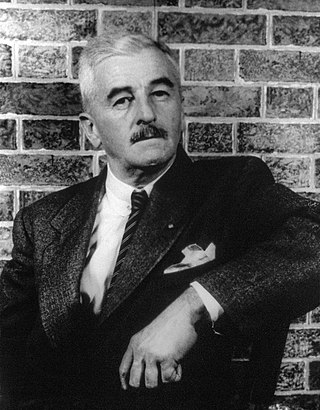
William Cuthbert Faulkner was an American writer. He is best known for his novels and short stories set in the fictional Yoknapatawpha County, Mississippi, a stand-in for Lafayette County where he spent most of his life. A Nobel laureate, Faulkner is one of the most celebrated writers of American literature and often is considered the greatest writer of Southern literature.

Light in August is a 1932 novel by American author William Faulkner. It belongs to the Southern gothic and modernist literary genres.

Absalom, Absalom! is a novel by the American author William Faulkner, first published in 1936. Taking place before, during, and after the American Civil War, it is a story about three families of the American South, with a focus on the life of Thomas Sutpen.

The Sound and the Fury is a novel by the American author William Faulkner. It employs several narrative styles, including stream of consciousness. Published in 1929, The Sound and the Fury was Faulkner's fourth novel, and was not immediately successful. In 1931, however, when Faulkner's sixth novel, Sanctuary, was published—a sensationalist story, which Faulkner later said was written only for money—The Sound and the Fury also became commercially successful, and Faulkner began to receive critical attention.
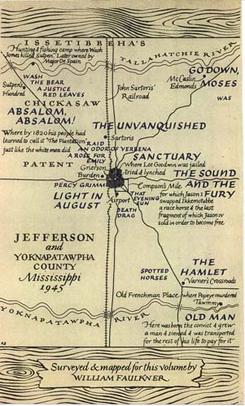
Yoknapatawpha County is a fictional Mississippi county created by the American author William Faulkner, largely based on and inspired by Lafayette County, Mississippi, and its county seat of Oxford. Faulkner often referred to Yoknapatawpha County as "my apocryphal county".
Louis Grenier is a fictional character in William Faulkner's novels and stories.
The Compson family is a fictional family created by American author William Faulkner for use in his novels and short stories. A once prominent family in Yoknapatawpha County, Mississippi, the family began to fall on hard times in the twentieth century. Principally depicted in The Sound and the Fury and in its appendix, they also make appearances in Absalom, Absalom! and stories such as "That Evening Sun". The family name is also referred to briefly in the opening chapter of Requiem for a Nun. Faulkner traced their genealogy from 1699 to 1945.
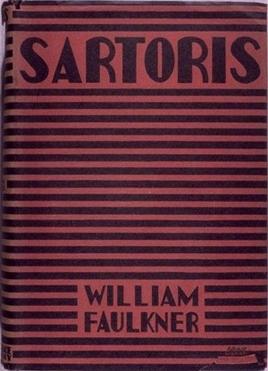
Sartoris is a novel, first published in 1929, by the American author William Faulkner. It portrays the decay of the Mississippi aristocracy following the social upheaval of the American Civil War. The 1929 edition is an abridged version of Faulkner's original work. The full text was published in 1973 as Flags in the Dust. Faulkner's great-grandfather William Clark Falkner, himself a colonel in the American Civil War, served as the model for Colonel John Sartoris. Faulkner also fashioned other characters in the book on local people from his hometown Oxford. His friend Ben Wasson was the model for Horace Benbow, while Faulkner's brother Murry served as the antetype for young Bayard Sartoris.
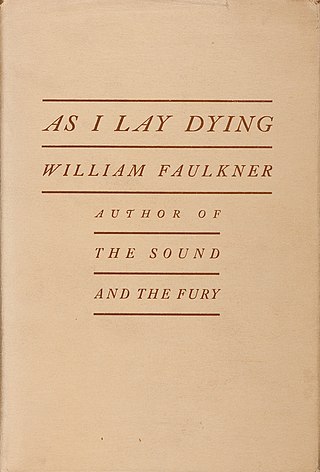
As I Lay Dying is a 1930 Southern Gothic novel by American author William Faulkner. Faulkner's fifth novel, it is consistently ranked among the best novels of the 20th century. The title is derived from William Marris's 1925 translation of Homer's Odyssey, referring to the similar themes of both works.

The scuppernong is a large variety of muscadine, a species of grape native to the southern United States. It is usually a greenish or bronze color and is similar in appearance and texture to a white grape, but rounder and larger.
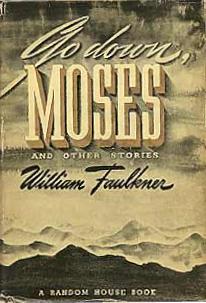
Go Down, Moses is a 1942 collection of seven related pieces of short fiction by American author William Faulkner, sometimes considered a novel. The most prominent character and unifying voice is that of Isaac McCaslin, "Uncle Ike", who will live to be an old man; "uncle to half a county and father to no one". Though originally published as a short story collection, Faulkner considered the book to be a novel in the same way The Unvanquished is considered a novel. Because of this, most editions no longer print "and other stories" in the title.

The Reivers: A Reminiscence, published in 1962, is the last novel by the American author William Faulkner. It was published a month before his death. The bestselling novel was awarded the Pulitzer Prize for Fiction in 1963. Faulkner previously won this award for his book A Fable, making him one of only four authors to be awarded it more than once. Unlike many of his earlier works, it is a straightforward narration and eschews the complicated literary techniques of his more well-known works. It is a picaresque novel, and as such may seem uncharacteristically lighthearted given its subject matter. For these reasons, The Reivers is often ignored by Faulkner scholars or dismissed as a lesser work. He previously had referred to writing a "Golden Book of Yoknapatawpha County" with which he would finish his literary career. It is likely that The Reivers was meant to be this "Golden Book". The Reivers was adapted into a film of the same name directed by Mark Rydell and starring Steve McQueen as Boon Hogganbeck.

The Mansion is a novel by the American author William Faulkner, published in 1959. It is the last in a trilogy of books about the fictional Snopes family of Mississippi, following The Hamlet and The Town.

Requiem for a Nun is a work of fiction written by William Faulkner. It is a sequel to Faulkner's early novel Sanctuary, which introduced the characters of Temple Drake, her friend Gowan Stevens, and Gowan's uncle Gavin Stevens. The events in Requiem are set in Faulkner's fictional Yoknapatawpha County and Jackson, Mississippi, in November 1937 and March 1938, eight years after the events of Sanctuary. In Requiem, Temple, now married with a child, must learn to deal with her violent, turbulent past as related in Sanctuary.

Flags in the Dust is a novel by the American author William Faulkner, completed in 1927. His publisher heavily edited the manuscript with Faulkner's reluctant consent, removing about 40,000 words in the process. That version was published as Sartoris in 1929. Faulkner's original manuscript of Flags in the Dust was published in 1973, and Sartoris was subsequently taken out of print.

Wappocomo is a late 18th-century Georgian mansion and farm overlooking the South Branch Potomac River north of Romney, Hampshire County, West Virginia, USA. It is located along Cumberland Road and the South Branch Valley Railroad.

William Faulkner (1897—1962) was an American writer who won the 1949 Nobel Prize in Literature. He is best known for his novels and short stories set in the fictional Yoknapatawpha County, a stand-in for his hometown of Oxford in Lafayette County, Mississippi.
"Mountain Victory" is a short story by American author William Faulkner first published in the December 3, 1932 issue of The Saturday Evening Post. The story is unusual among Faulkner's works in that it takes place outside of his fictional Yoknapatawpha County. It deals with historical themes common to much of Faulkner's later work, including social and racial divisions in the South following the American Civil War.
Isaac Parsons was an American planter, politician, and military officer in the U.S. state of Virginia. Parsons served as a Justice of the Peace of Hampshire County's District 3 from 1852 to 1853. He later served as a member of the Virginia House of Delegates representing Hampshire County from 1854 until 1857. Parsons was the grandson of Virginia House Delegate Isaac Parsons (1752–1796), the great-grandson of Colonial Virginia military officer William Foreman, and the grandfather of First Lady of West Virginia, Edna Brady Cornwell (1868–1958).
Knight’s Gambit is a 1949 short story collection by American author William Faulkner. Including the titular story, the book collects six of Faulkner’s stories about attorney Gavin Stevens, who also takes a leading part in his novel Intruder in the Dust (1948).
References
- Kirk, Robert W.; Klotz, Marvin (1965). Faulkner's People: A complete guide and index to the characters and fiction of William Faulkner. Los Angeles: University of California Press.